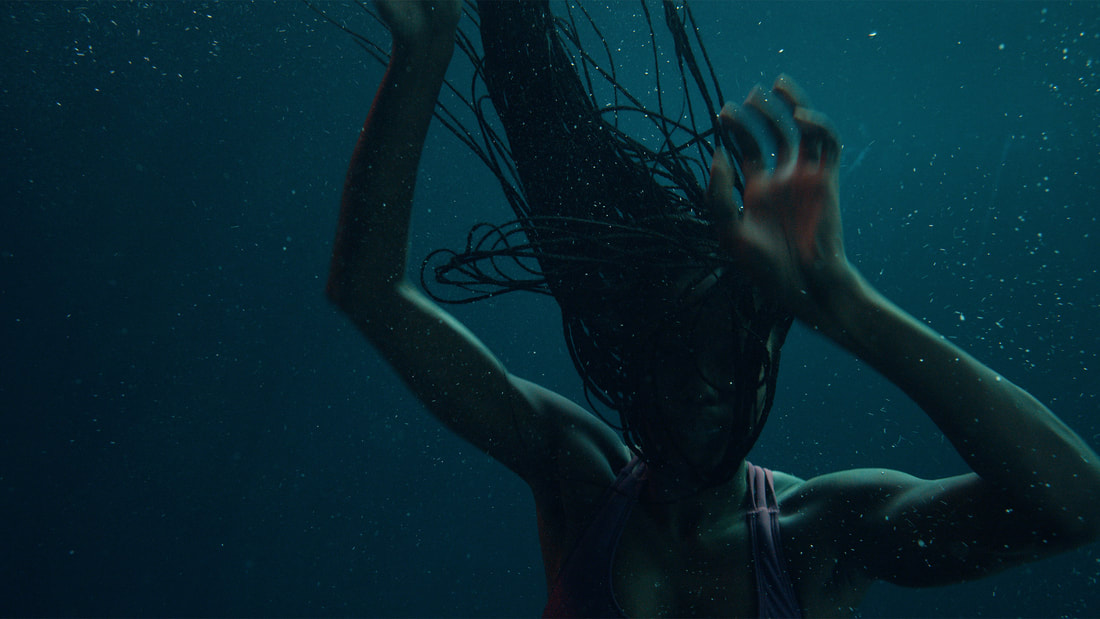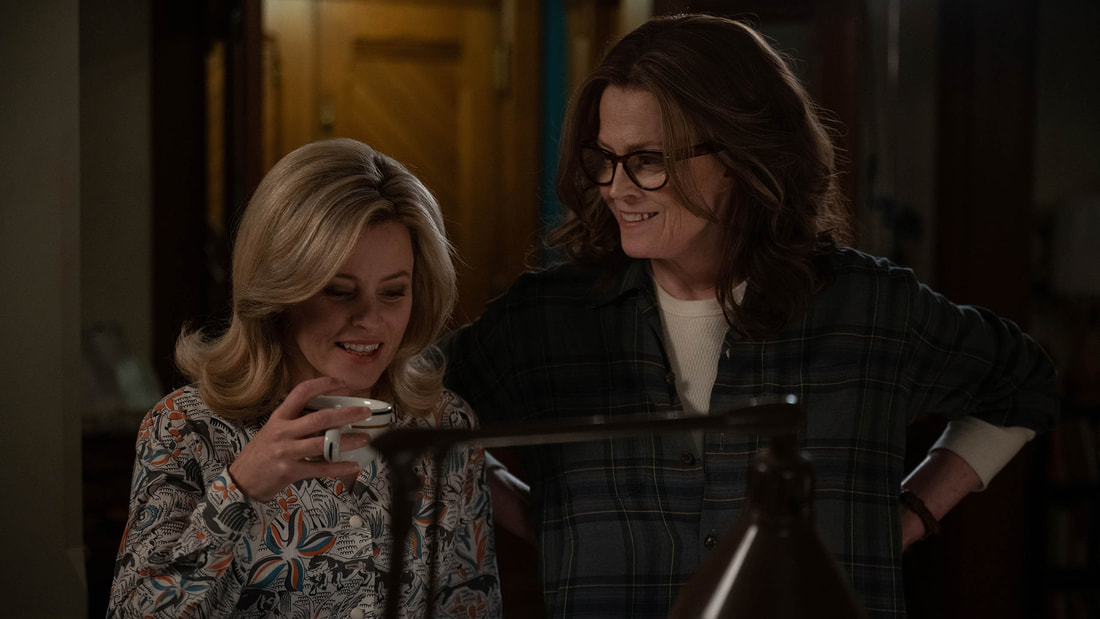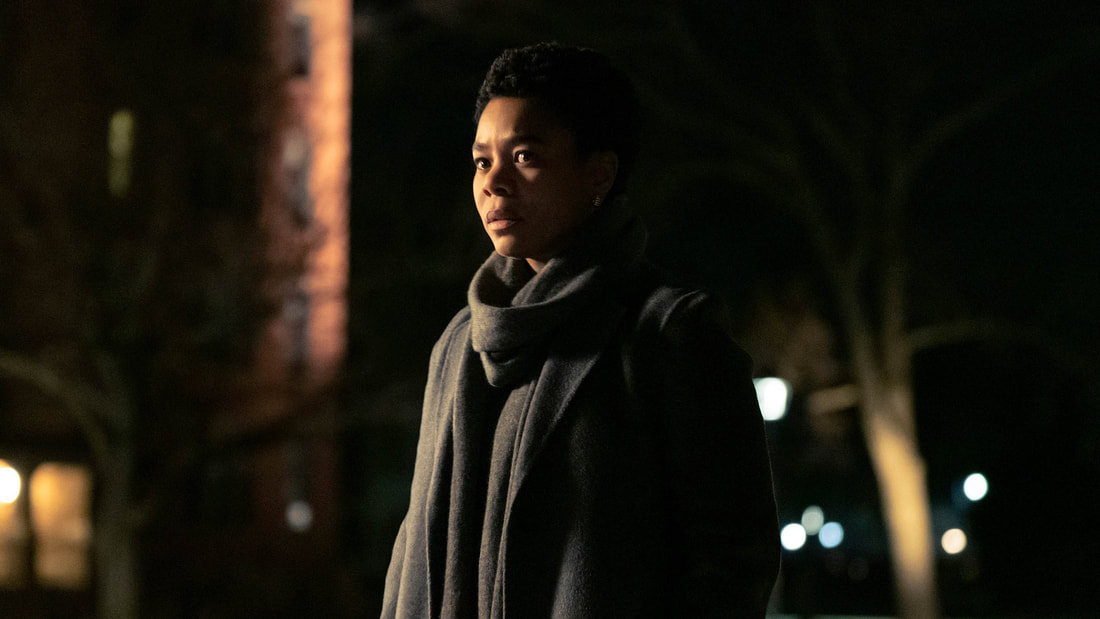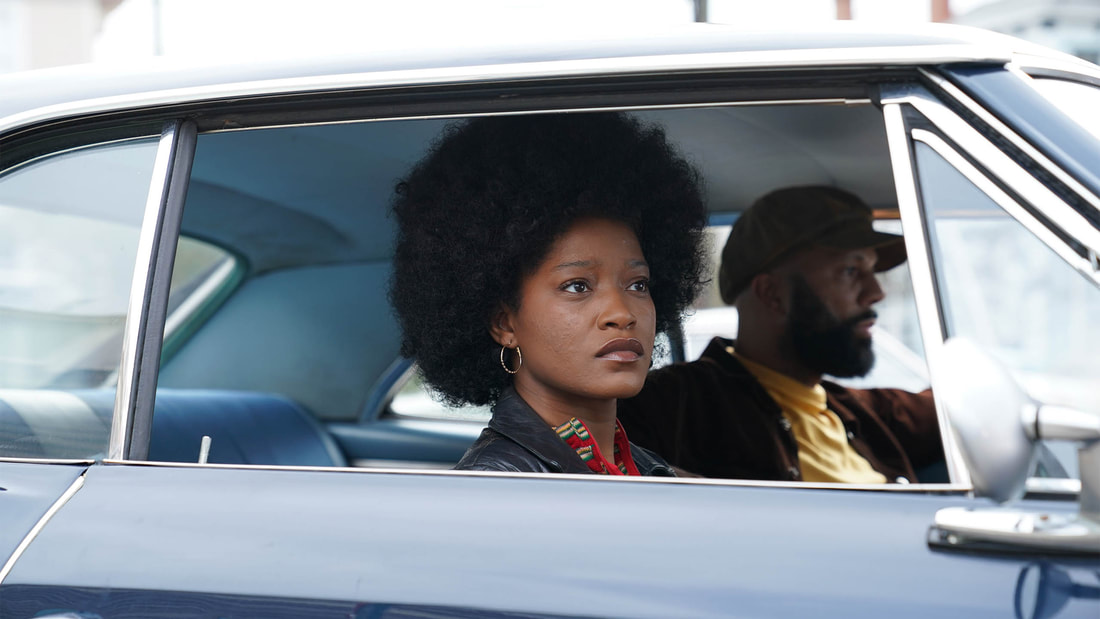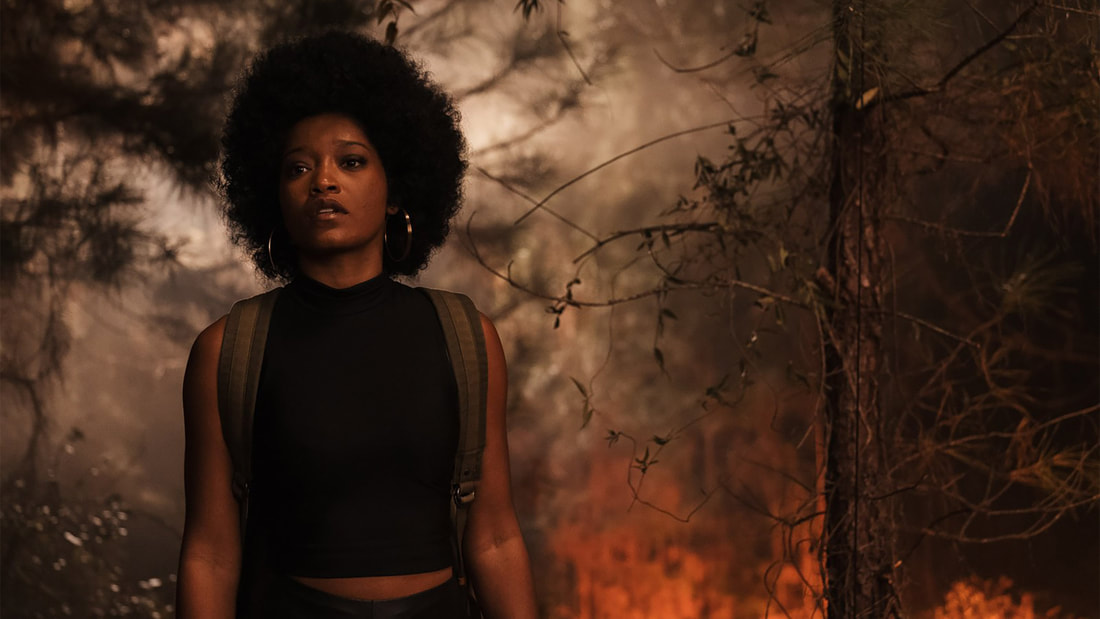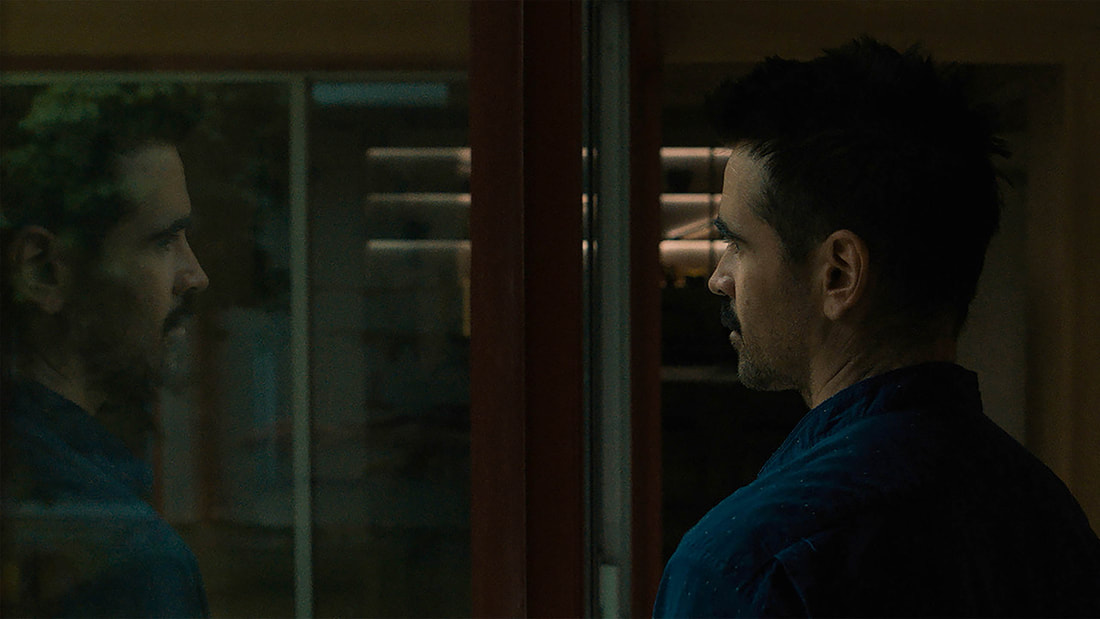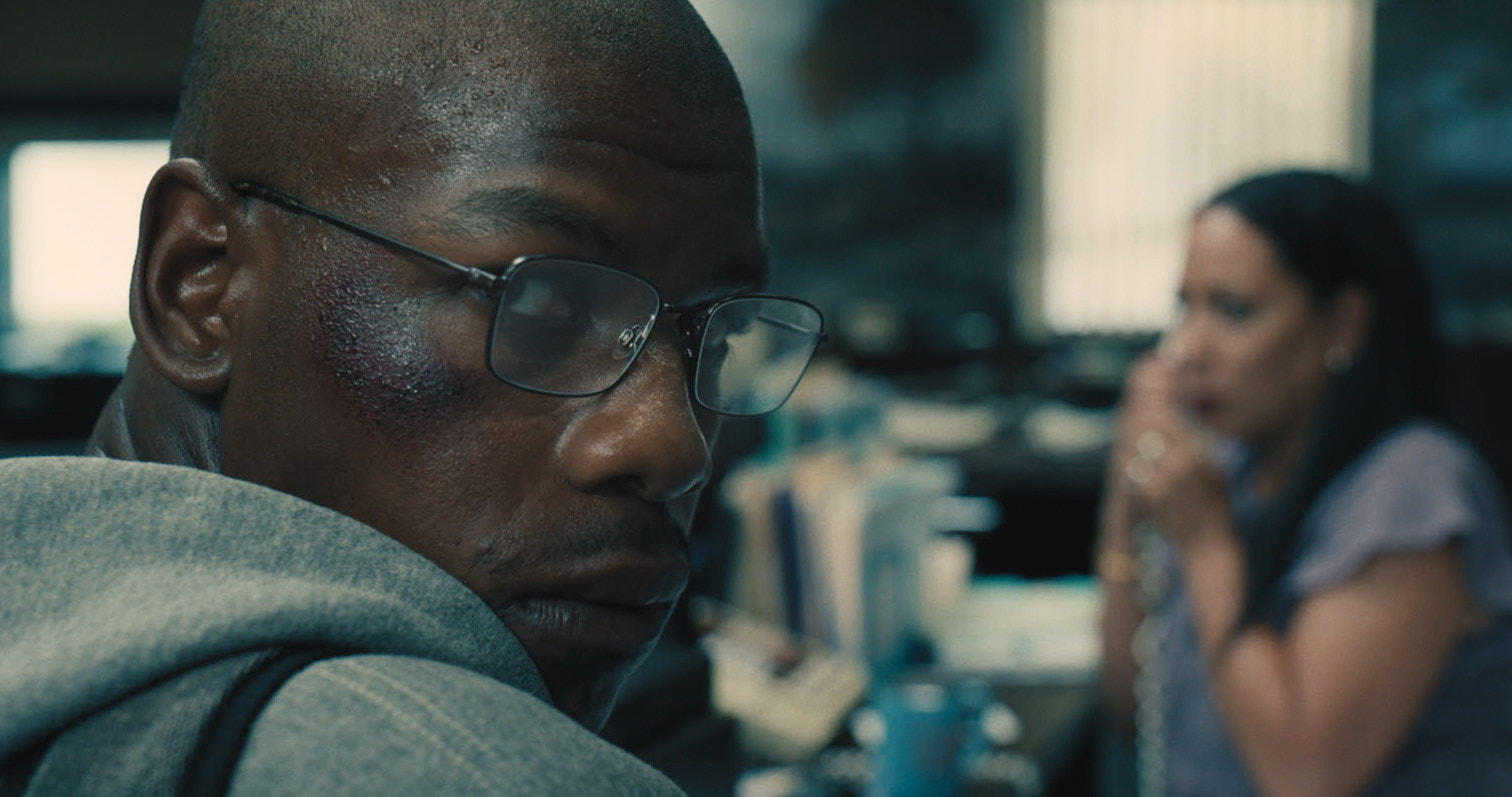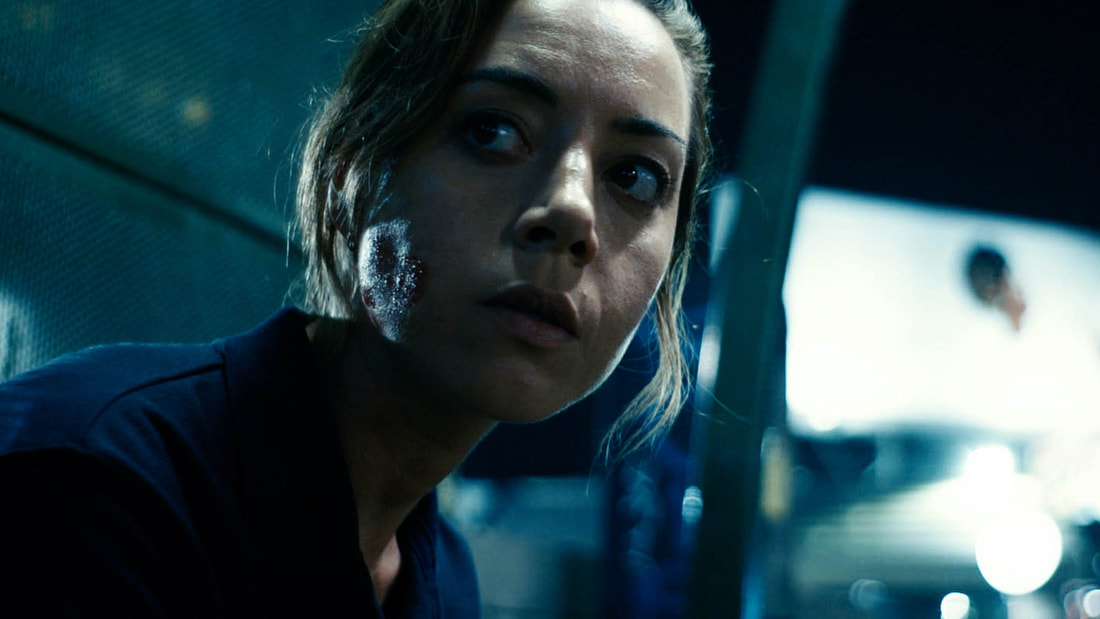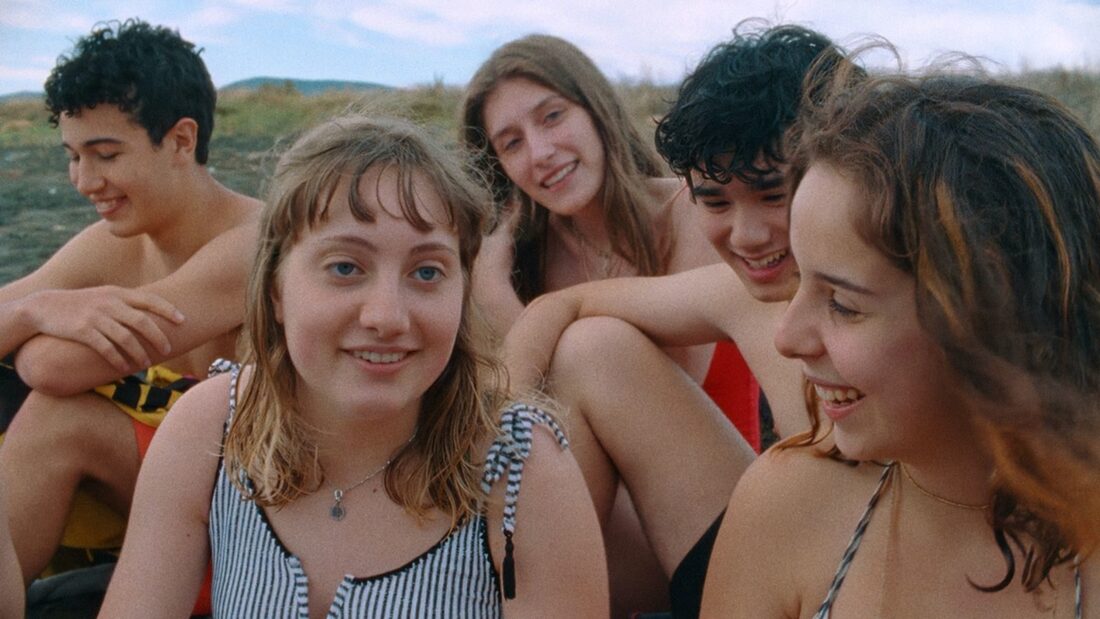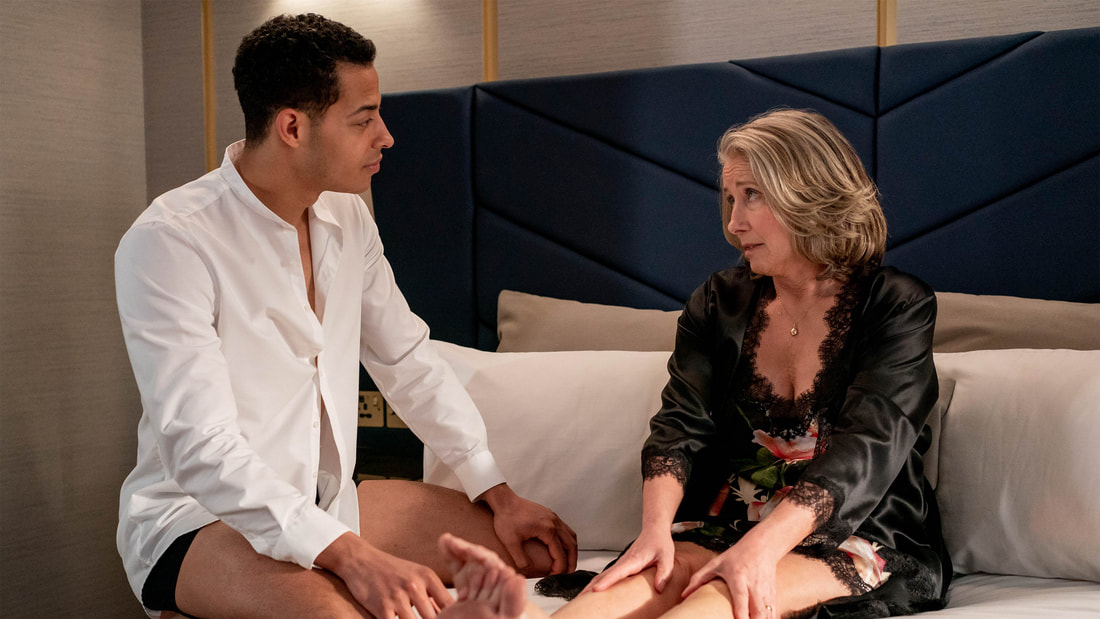[Sundance 2022] NANNY -- A Great Psychological Horror Film Exploring the Immigrant Experience1/31/2022
Review by Sean Boelman
It’s exceedingly rare for a horror film to win the top prize at any festival, and so it was a massive surprise when Nikyatu Jusu’s Nanny won the Grand Jury Prize at this year’s Sundance. That said, it is entirely understandable why this movie came out on top, because it is a wonderful exercise in atmosphere and tension.
The film follows an undocumented immigrant working as a nanny for a wealthy family in the Upper East Side as she is forced to confront the terrifying truth behind the American Dream. Lots of movies have explored the immigrant experience, but it’s pretty ingenious to structure it like a psychological horror film as Jusu does. For much of the first hour or so, the movie is a slow burn, moving along at a measured but deliberate pace. It feels like we are watching this character’s world and psyche unravel, and it’s easy to get wrapped up in it. It’s never a particularly scary film, although there is some imagery that is very creepy and the whole affair is quite tense. The movie explores a lot of issues when it comes to the immigrant experience, like the façade that is the American Dream and the way in which white Americans exploit immigrants in need. It’s clear from the dialogue that this is Jusu’s first script, because there are some things that are overt and somewhat sloppy, but it’s also very angry and passionate. Jusu writes the protagonist in a way that is extremely sympathetic. We get emotionally invested in her story of trying to get reconnected with her son, and forming the parallel to the character’s work as a nanny is a wonderful way of doing so. The supporting characters are far less interesting, but the lead is so compelling that it works nevertheless. Anna Diop gives a brilliant performance in the leading role that works on the level of both drama and horror. It’s a very vulnerable turn, which makes up for a lot of the issues that the script has. And in the supporting cast, Michelle Monaghan and Morgan Spector give enjoyable performances as her employers. The best accomplishment in this film is the way in which Jusu builds the atmosphere. The cinematography and score are both extremely haunting in a way that draws the viewer into the character’s psyche. Although some of the effects in the movie aren’t the best, the intent is there to a point that still makes them disturbing and not distracting. Nanny may have been an unorthodox pick for the Grand Jury Prize at Sundance, but it definitely earns this recognition. It is definitely one of the more successful horror debuts to come out of Sundance in the past few years. Nanny screened at the 2022 Sundance Film Festival, which ran virtually from January 20-30. Rating: 4.5/5
0 Comments
Review by Sean Boelman
Phyllis Nagy was nominated for an Academy Award for her screenplay for Carol, but has not released any work since then. She only directed her newest film, Call Jane, which is a relatively standard historical drama movie that benefits from a strong cast and a story that is important enough to speak for itself.
The film follows a married woman who must receive an illegal abortion after complications in her pregnancy, later joining a group who help find women the medical assistance they need. Hayley Schore and Roshan Sethi’s script is on the conventional side and exaggerates beats of the story in the expected ways, but it still works well. It does take a while for the movie to get to the meat of its story, with a majority of the first hour being spent on exploring the protagonist’s personal experience rather than the overall movement. But once the film starts to get into these women operating this underground network, it starts to be quite compelling. That said, this introduction does provide some exceptional characterization. It’s easy to get invested in the story because of the connection we have with the hero of the story. That said, there are some problematic aspects to this angle of the story. Although it doesn’t reduce the importance of the message, having a privileged white woman as the protagonist makes it feel like everything is being too sanitized.
Nagy did assemble a wonderful ensemble for her movie. Elizabeth Banks plays the lead role, and she gives a performance that, while not particularly deep, does exactly what it is supposed to do. Sigourney Weaver has a show-stealing turn in a supporting role, with some of the best scenes in the film.
Given the recent developments in anti-abortion laws in the United States, this story is more relevant now than it has been since the era in which it was set. It’s sad that American society has devolved back to this point, but this movie provides a wake-up call that is forceful enough to resonate but not so overwhelming as to be unpalatable for general audiences. There are definitely some questionable decisions made in the film from a directorial standpoint. Although the periodization in terms of the production design is quite strong, there are a lot of other things that don’t work. Some of the movie’s use of visual symbolism is so on-the-nose to the point of being frustrating. Call Jane may not be a groundbreaking film, but the performances are great in a way that makes it genuinely memorable. Even in its conventional approach, this story is powerful enough to be effective. Call Jane screened at the 2022 Sundance Film Festival, which ran virtually from January 20-30. Rating: 4/5 [Sundance 2022] MASTER -- Thought-Provoking Social Horror That Works Well Without Resolution1/31/2022
Review by Sean Boelman
Sundance often features many debuts coming from exciting minority voices, and Mariama Diallo, director and writer of Master, is one of the more exciting prospects of this year’s festival. A disturbing and thoughtful socially-conscious horror film, this is an intriguing movie that will stick with audiences.
The film follows two African-American women at a predominantly white college in New England who begin to have disturbing experiences. Independently, each of the movie’s two stories is compelling, but it is the way in which Diallo ties them together that really gives the film such an intense impact. One of the storylines focuses on the newly-instated dean of the college as she attempts to navigate the difficulties of being the token representative of diversity. This is the less horror-tinged of the two parts of the movie, but arguably the more harrowing, because of how its quietly grounded exploration of racism peels back the injustices of society. The other portion of the film is about a first-year student who finds that the community on campus is not as welcoming as she has expected. This portion of the script has a few moments that almost go a bit too far into its horror elements, but Diallo always manages to rein it in with a brutally bleak image of real-life racism. Perhaps the most interesting thing about Diallo’s approach to the script is her pacing. She is less concerned with resolution than she is with exploring ideas. There are a lot of loose ends throughout the script and questions that are left unanswered, but this lack of catharsis makes the point of the movie all the more effective. Regina Hall proves again here that she is one of the most underappreciated actresses working today. She brings such a quiet anger to the character, and it really fits the role. Other standouts are Zoe Renee, who carries her portion of the film quite well, and Amber Grey, who is a tremendous scene partner for Hall. The movie is also very confidently directed by Diallo. The use of atmosphere is top-notch and really creates an overwhelming sense of dread. And there is some imagery in the film that is very effectively disturbing, especially those which are rooted in real-life racist symbolism and ideology. Master may be on the uneven side, but there are so many exciting and interesting things in the script that its flaws can be forgiven. It’s such a confident debut from Mariama Diallo, and it will be exciting to see where she goes from here. Master screened at the 2022 Sundance Film Festival, which ran virtually from January 20-30. Rating: 4/5
Review by Sean Boelman
Most festivals have at least one dud in the competition, whose merit is more their intentions than what they actually accomplished, and this year, that is Krystin Ver Linden’s Alice. A poorly-paced film that only manages to find its groove in the last twenty minutes, this is one of the biggest wastes of potential in recent memory.
The movie follows a woman who escapes her life in slavery only to discover that she is actually living in the 1970s and slavery has been outlawed for over a century. Although the film is much less of a trainwreck than the similarly-premised Antebellum, this premise is seemingly just doomed to fail. One of the biggest issues with the movie is that it takes far too long for the protagonist to enter into the modern world. And while the film becomes much more enjoyable after it finally stops taking itself so seriously, with a Blaxploitation-inspired final act that is fun but rushed, viewers will have checked out by then. The movie definitely wears its message on its sleeve, with a speech in the last scene of the film that basically spells out exactly what the audience is supposed to take away from what they have just seen. And while it’s definitely a good anti-racist message, it definitely could have used a bit more subtlety.
Although Ver Linden does a great job of making the lead character compelling, the arc isn’t particularly well-defined. The character changes, but we don’t really see her grow. She just goes from point A to point B nearly instantly, without much of a path that takes her there, and the result is somewhat off-putting.
That said, Keke Palmer gives a committed performance that really sells the film. The script definitely works against her at times, with some dialogue that is extraordinarily stilted, but she eats up the few great scenes. Common, on the other hand, is just there for some reason and his only job is to react to Palmer. There is also not a consistent style to the movie, but even that can be chalked up to the issues with the script. The first half of the film is a serious historical drama, and then the second half is a stylish action romp. Some of the individual elements of the execution are promising, but it’s so all-over-the-place that it doesn’t work. Alice is an absolute mess of a movie with a few good elements but very few that are great. Although the intent of the film is noble, the execution of it is so lackluster that it is entirely frustrating. Alice screened at the 2022 Sundance Film Festival, which ran virtually from January 20-30. Rating: 2.5/5
Review by Sean Boelman
Video-essayist-turned-filmmaker Kogonada made a splash with his intimate directorial debut Columbus, and while his newest film After Yang is more ambitious in overall scale, it is also rooted in emotion. Nevertheless, this combination of sci-fi, family drama, and mystery is far less moving than his first feature.
The movie follows a family who is faced with an unorthodox grieving process when their A.I. helper malfunctions unexpectedly. It’s a fascinating premise that has the potential to be a profound study of the connections that humanity has both with technology and one another, but in expanding Alexander Weinstein’s short story, Kogonada finds substance in the wrong areas. In terms of surface-level commentary, the film is discussing the relationship and dependence that society has on modern technology. Kogonada wisely avoids making this the primary focus of his movie, though, as it easily could have come across as a paranoid rant if so. Instead, for better or worse, the film is more interested in exploring the things that make us human, a theme that has been explored over and over again in the genre. The character development in the movie is intriguing, even if it isn’t always effective. Interestingly enough, the most compelling character in the film is the android who is experienced primarily through the lens of others. His development is done through how he is seen by others, and it’s the most authentic connection that is formed in the movie. However, the performances here are frustratingly cold. Colin Farrell is supposed to be playing an unorthodox grieving father, but his performance is oddly detached. There are a few scenes in which he expresses pain, but for the most part, he’s just sort of drifting in this bereft daze. Justin H. Min gives a solidly nuanced performance as the android with a heart, but Jodie Turner-Smith, Haley Lu Richardson, and Clifton Collins Jr. are wasted here. Even more off-putting are the film’s frequent tonal shifts. The movie starts off as a slightly quirky sci-fi, becomes a somber family drama, then a mystery, goes back to somber drama, and then becomes another (different) mystery. Had the film settled on one of its tones and stuck with it to explore these themes, it would have been much more effective. That said, the movie is undeniably wonderful in a visual sense. Kogonada’s eye for composition really brings out the emotion in the shots, even when the script doesn’t do it any favors. And the use of futuristic images, including an extremely memorable title sequence that is one of the most enjoyable this side of Gaspar Noé, shows the potential that this had if only it would have embraced its sci-fi elements. After Yang has a lot of elements that work quite well on their own, but they are so at odds with each other tonally that the result is beyond uneven. It’s exciting to see Kogonada take such big swings, although it definitely could have used a bit more development. After Yang screened at the 2022 Sundance Film Festival, which runs January 20-30. Rating: 4/5
Review by Sean Boelman
The film voted by audiences to be their overall favorite of the festival was not one of the many crowd-pleasers in the lineup, but the whistleblower documentary Navalny. And while it is far from the best movie of the slate (and not even the best documentary), Daniel Roher has made a film that is both thrilling and angering.
Shot as the events unfold, the movie follows a Russian activist who survives an assassination attempt with a lethal nerve agent during his fight against corruption in Moscow. It’s a truly wild story that unfolded quite recently, and so it has a feeling of timeliness and urgency that not many of the other documentaries that played in the U.S. Documentary Competition had. The film does a really good job of making the audience sympathize with its subject. Roher really explores why there has been an entire movement of people to come out and support him in the face of the outright persecution he has faced. But beyond that, it is also easy to get behind him for what he stands for politically. Roher joins the activist early on in his journey, before things start to heat up even more, and so the audience gets to watch everything as it plays out. The movie even bills itself as a thriller, and the label is certainly earned. Even though informed viewers will know where this story ends up, the twists and turns are fascinating. The film mostly takes a fly-on-the-wall format, although there are some interviews sprinkled in to provide necessary context. The middle section of the movie turns into an investigative documentary of sorts, following Navalny and his team as they set out to find the truth behind what happened to him, and that is the most interesting portion. What is most impressive about Roher’s film is the extraordinary access he was able to get to Navalny. The interviews in which Navalny is just on-camera speaking with the filmmaker about his story are fascinating, and even introduce some interesting questions about standing up in the face of opposition. Obviously, this movie is all about freedom of speech and censorship, a topic which hits close to home to a lot of Americans these days. In a time in which there are so many threats to democracy, this film about someone who is fighting for freedom in one of the most oppressive places in the world is inspiring. Navalny benefits from the profound access it has to its subject, who is an absolutely fascinating person, making for a documentary that is quite effective. It’s not particularly surprising, but it’s a well-made exposé of corruption and the people who are fighting back against it. Navalny screened at the 2022 Sundance Film Festival, which runs virtually from January 20-30. Rating: 4/5
Review by Sean Boelman
Some of the buzzier titles to screen at Sundance are always the star-driven films, and while some are great, others end up being movies that are just alright but are elevated by their cast. Abi Damaris Corbin’s 892 is an entertaining thriller which turns into something genuinely memorable thanks to John Boyega’s great turn.
The film follows a Marine veteran struggling to reintegrate into society as he holds up a bank in a desperate attempt to get his voice heard. Although the movie is based on a true story, it plays out in a very Hollywood-friendly manner, hitting a lot of the genre’s typical beats and full of overly sentimental moments to hammer home the film’s message. This is definitely a very tense movie, but it still plays out in a way very similar to other films that have come in the past. Corbin and co-writer Kwame Kwei-Armah do a good enough job of establishing the stakes for the audience to really get invested in the movie and get caught up in its suspense. Corbin’s approach to directing the film is competent but conventional. It’s mostly a single-room thriller, with most of the action occurring in and around the bank with the exception of the introduction and a few brief cutaways. And the movie does a very good job of making the audience feel the sense of claustrophobia that really drives the suspense forward. There is a lot of potential in the film for it to be a commentary on the wrongdoing of the US military towards its veterans, but this feels like it was used more as context than out of a legitimate interest in it. It’s frequently discussed how the protagonist is motivated by his veteran’s benefits being stolen from him, but the movie never really discusses it substantially. The methods of characterization used in the script are very straightforward, but it is effective at doing what the film intends to accomplish. The use of the protagonist’s wife and daughter to create an emotional connection to the character may be low-hanging fruit, but it gives the viewer that necessary in-point to the story. That said, this is a movie that really banks on the talents of its cast to work. Without strong performers in the roles, it would have been another dime-a-dozen thriller. John Boyega does some exceptional work here, bringing an intense humanity to a role that easily could have been exaggerated. And in the supporting cast, Nicole Beharie shines as one of the hostages, and the late Michael K. Williams is strong as the police negotiator. 892 is a decent movie all-around, but John Boyega is the reason it works so well as it does. It’s a palatable, mainstream film that deals with some important issues somewhat shallowly, so it should be an easy pickup for release later this year. 892 screened at the 2022 Sundance Film Festival, which runs virtually from January 20-30. Rating: 3.5/5
Review by Sean Boelman
With what is perhaps the worst title of any of the films in the festival, John Patton Ford’s Emily the Criminal promised to be a thriller with a socially-conscious edge. And while there are no complaints to be had in terms of its entertainment value, the movie only has fleeting moments of profundity.
The film follows a woman who, struggling to get out of her student loan debt and unable to find a high-paying job out of college, gets roped into a credit card scam and begins to spiral into the criminal underworld. It’s the same type of “good person driven to desperate measures” thriller that we have seen plenty of times before, and little is done to make it stand out. Even though the movie goes exactly in the direction that one would expect, it does a good job of keeping the audience on the edge of their seats. The more high-anxiety scenes, while not unpredictable, are shot in a way as to heighten the tension to create an artificial feeling of suspense even though the viewer knows what is going to happen. Ford also imbues the film with an intriguing aesthetic. Although the movie is set in the modern day, it almost has a retro vibe to it. It has a vibe that is almost reminiscent of the Safdies’ work, albeit at a scale that is much less aggressive. There are a few scenes done in a way that shows Ford has a propensity for shooting action. It seems that Ford is trying to say something about the flaws of the education system with his film, but it doesn’t end up amounting to much more than a strong motivation for his characters. Apart from one scene that absolutely skewers the system of unpaid internships, the movie is disappointingly toothless in this regard. That said, even though the motivation for the protagonist is solid, the character is somewhat problematically-written. Frequent confrontations in which the character is involved make the character feel somewhat stand-offish, including the opening scene which threatens to get the audience off on the wrong foot. Aubrey Plaza’s performance in the leading role is very good, full of the required anger it takes to pull the character off. Admittedly, there isn’t anything particularly nuanced about it — the character is very one-note, as is the script — but she does exactly what the character demands, and well. Theo Rossi, on the other hand, is terrible. The performance he gives is just unintelligibly misguided. Emily the Criminal is enjoyable enough for what it is, although it doesn’t accomplish the loftier goals it sets for itself. For those seeking out an entertaining thriller that has glimpses of provocation but isn’t too challenging, this is worth watching. Emily the Criminal screened at the 2022 Sundance Film Festival, which runs virtually from January 20-30. Rating: 3.5/5
Review by Sean Boelman
There aren’t a lot of films that give young people the credit they deserve as individuals who can be genuinely intelligent and wise, and that is something that really makes Futura unique. However, this documentary is arguably more effective in intent than execution, as the directors’ work here feels oddly removed.
In the movie, filmmakers Pietro Marcello, Francesco Munzi, and Alice Rohrwacher interview teenagers throughout Italy about their dreams and their visions of the future. It’s an interesting approach to explore the world through the eyes of the people who will be shaping it and inheriting it, but it also feels like the movie is less profound than it believes it is. One of the fascinating things that this film does is call attention to the things that are important to today’s youth. However, one has to wonder how much of this is actually the subjects of the movie philosophizing, and how much of it is driven by the questions that the interviewers are asking. Would these kids even be discussing, much less thinking about these things without the guiding hand of the filmmakers? There is also the fact that the film feels very distant from its subjects. The movie almost seems to look at the people it is interviewing as a sort of other. Although the film definitely deserves points for even acknowledging and respecting their perspective, it feels as if the audience is supposed to be surprised at the fact that these people are so smart, which feels extremely reductive.
And for what is meant to be a portrait of the entire country of Italy, it’s a shame that the interviews in the movie seem rather limited. Although the filmmakers traveled the country to interview teens from a variety of places, they failed to recognize much in the way of fringe groups and those who are generally considered outsiders among their peers.
This does cause the film to feel rather derivative at a certain point. The interviews aren’t disinteresting, but after a while, the movie has gotten its message across and is simply beating a dead horse. It’s easy to see how the world is a dark place, but there is hope to be found if people are optimistic. The cinematography has some glimpses of gorgeousness. It’s often beautifully-shot with some wonderful use of the scenery of Italy. However, given the fact that a majority of the film is just talking heads, there is only so much that can be done aesthetically, and Marcello, Munzi, and Rohrwacher do their best to make it visually interesting. Futura shows a lot of potential, and should be appreciated for its great intentions, but it’s just not anywhere near as effective as it could have been. It’s noble, even if its efforts do come up mostly hollow. Futura is now playing in theaters. Rating: 3/5
Review by Sean Boelman
If the COVID-19 pandemic has had one positive effect on the film industry, it is an increased appreciation for intimate chamber pieces. Sophie Hyde’s Good Luck to You, Leo Grande is one hell of a two-hander, with a script that is wonderfully witty and two brilliant performances at its center.
The movie follows a widow who hires a male escort in her search for emotional and physical connection, but ends up finding herself in the process. It’s a premise that sounds like it could very easily turn into something preachy or overly sappy, but Katy Brand’s script maintains a certain level of nuance and subtlety to it that works very well. Brand sets up the film around a series of meetings that occur between the two characters. And for a movie that is a chamber piece, primarily set in a hotel room and composed predominantly of pillow talk, it finds a way of making these conversations cinematic. Apart from one section that is a bit more somber than the rest, it’s pretty thoroughly gripping. Perhaps the most impressive thing is the way in which the film frankly explores these traditionally taboo themes. The movie really dissects the stigma that society has against sex workers, both about the sex worker and their client, as well as topics of sex positivity and body image. At first, it seems like the protagonist is a standard grieving widow and the co-lead is a charming pretty boy, but it becomes obvious starting with the second meeting that there is more to them than they initially let on. It’s a supportive, grounded take on a profession that is far too often disparaged in the media. Emma Thompson has always been an extremely talented actress, and the work that she is doing here is pretty exceptional. She absolutely eats up the dialogue in a way that will really hit the viewer in the heart. But perhaps more surprising is the fact that Daryl McCormack holds his own against the more seasoned performer. Given that the film is a dialogue-driven comedy set in a small number of locations, it doesn’t have a lot that is obvious about its execution. However, some of the quieter aspects of filmmaking, such as the blocking, really shine here and compound the excellent work being done by the two actors. Good Luck to You, Leo Grande is the type of movie that is somehow extremely memorable despite the fact that it isn’t very showy. It’s a charmer and a crowd-pleaser, but it still approaches its themes in a thoughtful way. Good Luck to You, Leo Grande screened at the 2022 Sundance Film Festival, which runs virtually from January 20-30. Rating: 4/5 |
Archives
July 2024
Authors
All
|
|
|
disappointment media
Dedicated to unique and diverse perspectives on cinema! |

